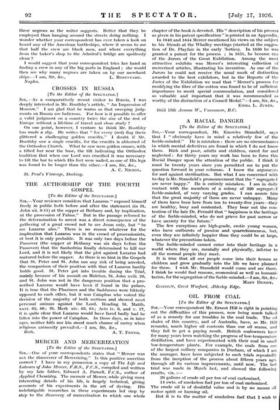THE AUTHORSHIP OF THE FOURTH GOSPEL
[To the Editor of the SPECTATOR.] Sin,—Your reviewer considers that Lazarus " exposed himself freely in public both before and after the statement (in St. John xii. 9-11) at the supper at Bethany and, by implication, at the procession of Palms." But in the passage referred to the determination to arrest was a direct consequence of the gathering of a great crowd not to see Jesus only, but " to see Lazarus also." There is no reason whatever for the implication that Lazarus was in the crowd of processionists, at best it is only probable. It was only two days before the Passover (the supper at Bethany was six days before the Passover) that the Sanhedrin finally determined to kill our Lord, and it is not likely that the plot against Lazarus had matured before the supper. As there is no hint in the Gospels that St. Peter and St. John ran any risk of being arrested, the comparison of their position with that of Lazarus hardly holds good. St. Peter got into trouble during the Trial, mainly because of his assault on Malchus, St. John xviii. 26, and St. John was not in the dangerous position that a pro- scribed Lazarus would have been if found in the palace. It is true that the Pharisees and the Sadducees were bitterly opposed to each other, but it was Caiaphas who voiced the decision of the majority of both sections and showed most personal animus against the Lord. Reading St. Matth. XXVi . 65, 66; St. Mark xiv. 63, 64; Acts iv. 6, and v. 17, it is quite clear that Lazarus would have fared badly had he fallen into the power of Caiaphas. In those days, as in later ages, neither kith nor kin stood much chance of mercy when religious animosity prevailed.--I am, Sir, &c.,










































 Previous page
Previous page